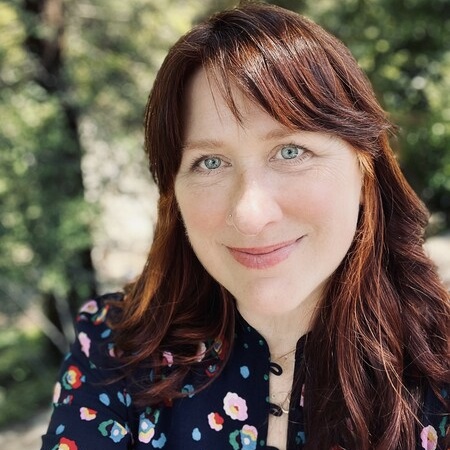Some years ago, I was scheduled for herniated disc surgery on the Monday morning after Easter (when “self-care time” for preachers begins. You know: bubble baths, major surgery).
So it was perplexing when my primary care doctor called me on a Thursday evening ten days before surgery, as I was putting the finishing touches on approximately 9 orders of worship for Holy Week. Why was I hearing from her and not from my neurosurgeon—for whom I had run a gauntlet of presurgical testing that day?
She was blunt, and got right to the point. “That chest x-ray you had today? It showed a mass. I need you to go in for a CT scan of your lungs tomorrow,” my doctor said.
“Does it have to be tomorrow?” I asked. “It’s Holy Week. Kind of like Sweeps Week for clergy.”
“Yes, Molly. Tomorrow.”
It helped that I am a slow thinker, and an optimist. I didn’t yet believe an aggressive cancer was doing its best to quietly kill me when I climbed into the pulpit that Palm Sunday, then the following Good Friday, and finally on Resurrection Day.
I am normally an open book to my congregation. But this news had to stay entombed until I could metabolize it somewhat. I also wanted to preserve my congregation’s experience of Holy Week without contaminating it with fruitless anxiety, especially those poor visitors and newbies in the mix who might feel like they were eavesdropping on a private family affair.
So I did what I rarely do: bracketed my personal life from my pastoring life while preaching through themes of life and suffering and death and resurrection, while my body worked its mysteries in parallel. A few trusted lay leaders in the know solemnly caught my eye from the fifth pew.
A few weeks later, I was ready to speak with more certainty about diagnosis, treatment, and my own spiritual orientation to the whole mess. I shared the news from the pulpit that I had Ewing Sarcoma. It would require lopping out half a lung, followed by 10 months of relentless chemo. It would not ultimately take my life but would take a lot of other things away that I would never get back, and it seemed only fair to clue my congregation in rather than bright-siding or minimizing the reality I was facing, and them along with me: that their young pastor, with young children, might die on their watch.
After all, hadn’t we drilled for this? Hadn’t we talked relentlessly about life after death, and life in the midst of death? About how to square the idea of a good God with the terrible things that happen in the course of having finite bodies? About the superpower of vulnerability, and the spiritual possibilities inherent in showing up whole, frail, flawed, scared, with all of our pieces and parts in the same place?
If I, their pastor, chose this time of all times to start faking it, I would be doing them no favors. Our people are looking to us to see how we navigate the hardest stuff that life sends our way—not because we’re going to do it with saintly forbearance or perfect spiritual maturity, but precisely because we’re not—and that’s going to help them in their own fragility and fear.
I’ll tell you just a couple concrete things my church and I did as I preached and pastored through cancer treatment. But first I want to affirm that there is a wide range of normal related to communication when the pastor gets sick, from “tell them nothing” to “tell them everything, down to mouth sores and TMI about your GI.” As our friends in AA say, we’re only as sick as our secrets—and the less we tell our congregations, the more they are going to imagine the worst and project (let’s be honest, they’re going to project anyhow—but it’s much easier to project onto a blank screen).
We clergy have a right to our privacy, and to work out our own salvation with fear and trembling (and without scores of people looking over our shoulder). But I believe that church members, like the children in our lives, deserve as much truth as they are asking for when it comes to hard things, and the best home truths I have are the ones I’ve lived.
So here’s what I did. First, I started a no-holds-barred blog. I’m an external processor, and I knew I’d need to write publicly to figure out what was happening to me and how I felt about it all. But I knew not everyone in my congregation could handle that level of disclosure about my body nor blows to my faith, and I didn’t want every sermon to be limned with cancer. So I put it all in the blog (which eventually became a book), and invited my church folks to mine it for every gory detail or ignore it altogether according to what they needed.
Second, I got very clear, very fast that chemo would put serious limitations on the amount of preaching and pastoring I could do. Cancer became my job for a calendar year. The church hired a lovely support pastor to do most of my job. I preached occasionally, participated in our associate pastor search committee, and continued to go to supportive Pastor/Parish Relations Committee meetings. But I offered no pastoral care and attended no regular church committee meetings.
I still went to church—because I needed church. And with scant exceptions, my congregation understood that their Chief Comforter needed comfort herself, and navigated the boundaries beautifully. They did what good churches do best in times of health crisis: helped with rides to medical appointments, took our kids out for ice cream so my spouse and I could rest or cry, and brought us entirely too many tupperwares full of butternut squash soup.
I understood that when I did take the pulpit, as I did the following Easter with a half-inch of new peach fuzz gracing my dome, I had a responsibility. I could neither ignore the bald fact of my own mortality, nor use it to manipulate people’s emotions. I had to thread a middle path: using the real stuff of my own life to point away from myself and toward a more universally available experience of post-traumatic healing and joy. The preacher tells personal stories not to focus attention on our individual pain or growth, but to offer a lens onto the wider human experience (also: they are the stories we know best, and the stories we have permission to tell). Told appropriately and well, these stories reveal much more about the heart of the listener than the life of the preacher.
It helped that we knew when my health crisis was likely to end. In open-ended, or naturally more private situations, the boundaries and extent of disclosure can be trickier: a divorce, the death of a spouse or child, a more complex diagnosis like major depressive disorder.
Yet I still encourage preachers to be as honest as they can with their congregation, to model vulnerability and interdependence as much as possible and to receive the gifts of blessing and practical support a good church can offer.
If your congregation is not healthy, disclosure can feel unsafe, even job-threatening. But disclosing a diagnosis and inviting people into your humanity is also an opportunity to ask the congregation to keep maturing spiritually and be the church they say they want to be. It also gives the family system of the church a chance to set clearer limits on bad behavior when the usual suspects inevitably misbehave (I’m thinking of my first call, when the senior minister’s wife had a cancer recurrence but kept it private, and the church busybody followed her around the supermarket to see if she was wearing a wig again).
Our people also need to see us testing our stated theology and spirituality in real time against real adversaries. They will see that our sometimes shaky faith is a blueprint for real living: whether we are facing our mortality, finding it hard to forgive people who hurt us, struggling with mental or physical health, parenting or any kind of caregiving, or experiencing a crisis/evolution of faith. The more real we make these moments for them, without making it about us—the more practical good our preaching can do for them when they face the same travails.

